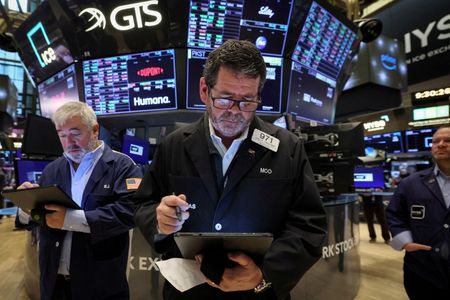(Reuters) -Bruised bond market investors will seek some solace from U.S. jobs data and European inflation numbers out in the week to come, while China is battling to shore up its markets and economy, and the outlook for grains is uncertain.
Here’s a look at the week ahead in markets from Lewis Krauskopf in New York, Kevin Buckland in Tokyo, Yoruk Bahceli in Amsterdam, and Nigel Hunt and Dhara Ranasinghe in London.
1/HOT, COLD – OR JUST RIGHT?
With Treasury yields surging and stocks wobbling, major data in coming days will test the U.S. economy’s temperature as investors worry that the Federal Reserve may keep interest rates higher for longer.
The August employment report out on Friday takes centre stage: July non-farm payrolls showed the economy added fewer jobs than expected, but solid wage gains and a declining unemployment rate to 3.5% pointed to continued tightness in labor market conditions.
Other data such as consumer confidence, the state of manufacturing, and inflation, with the latest personal consumption expenditures index is also due.
The readings will come on the heels of Jerome Powell’s warning at the annual Fed confab in Jackson Hole, Wyoming, that the world’s top central bank may need to raise interest rates and 10-year U.S. Treasury yields hitting their highest since 2007.
2/ THE TOUGH PART
For a year it was a no-brainer that the ECB would be hiking rates to contain high inflation — its key rate rose swiftly to 3.75% from below 0%.
Now comes the tough part as the economy sputters. Data showing a slide in business activity has convinced many traders that a pause in September is likely. Yet Thursday’s flash euro area August inflation number, which follows releases from some member states, could be the decider.
Euro zone consumer prices rose by 5.3% in July versus 5.5% in June, extending a downtrend that started last autumn. The closely-watched underlying gauge was flat at 5.5% but services inflation rose.
Germany’s Bundesbank has warned of a growing risk that consumer price growth gets stuck above 2%. August’s 20% surge in European gas prices suggests disinflation could be slow. It is too soon to rule out a September hike.
3/ PARTING WAYS
Bond investors are keen to leave behind a painful August that saw a rethink of how long rates will stay higher as a strong U.S. economy put the recession fund managers have long pined for even further out of reach.
Longer-dated U.S. Treasury yields soared to a 16-year high and real rates, adjusted for future inflation, jumped above 2% for the first time since 2009, unnerving stock markets.
But just as investors were digesting that narrative, a deepening downturn in business activity pointed to more pain ahead for Europe’s stumbling economies, prompting double-digit drops in British and German bond yields in recent days.
Now, benchmark 10-year U.S. Treasuries are set for their worst monthly performance since February, with yields up nearly 30 basis points in August. But a gloomier outlook has seen smaller rises in German and British yields.
4/ A GIANT SHIP China is taking ever more steps to revitalize drooping equities, a languishing currency, a teetering property market, and a floundering economy – except the big one investors want: bold fiscal stimulus. Recent days have seen more than 100 A-share companies reportedly announcing buybacks at the request of regulators keen to shore up market confidence. The PBOC has set much stronger-than-expected mid-points for the yuan, building a floor above recent 9 1/2-month lows. Real estate is at the centre of the storm – silent Country Garden development sites show the sector’s sorry state. Some developers don’t have the cash to pay workers – or debt obligations. President Xi Jinping told a BRICS summit that China’s economy is a “giant ship” that will “forge ahead.” PMIs on Thursday and Friday will give the latest evidence of any leaks.
5/ BITTER SWEET
El Nino – having emerged for the first time in seven years – is posing a growing threat to global food supplies with the U.S. Climate Prediction Center saying that the weather phenomenon is expected to strengthen through the winter of 2023/24.
India’s monsoon rains have suffered, with this month set to be the driest August since records began in 1901. The world’s most populous country is already concerned about the threat to production of several basic commodities, including rice and sugar.
India’s export ban of non-basmati white rice last month sent global prices sharply higher and the country is expected to prohibit mills from exporting sugar from October.
Agricultural production in other Asian countries, including major palm oil and coffee producer Indonesia, and Thailand – one of the world’s top sugar exporters – is also expected to be hit by dry weather in coming months.
(Compiled by Karin Strohecker; Editing by Sharon Singleton)






